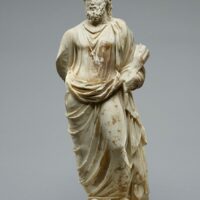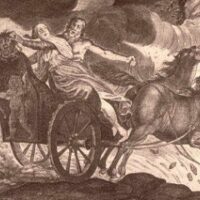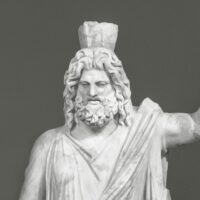Tunupa : God of Nature
Listen
At a glance
| Description | |
|---|---|
| Origin | South American Mythology |
| Classification | Gods |
| Family Members | N/A |
| Region | Bolivia, Peru, Chile |
| Associated With | Rain, Thunder, Lightning, Water, Harvest, Fertility |
Tunupa
Introduction
Tunupa is a prominent deity in Aymara mythology, revered as a god of volcanoes, thunder, and lightning. He is central to the indigenous beliefs of the Aymara people, who inhabit the Andean region of South America, particularly Bolivia, Peru, and northern Chile. Tunupa is associated with creation, fertility, and the moral order of the universe. His myths are deeply connected with the natural landscape, especially the volcanic mountains and the vast salt flats of the Altiplano.
As a benevolent deity of water, fertility, and abundance, Tunupa holds a significant place in the Andean worldview. Often depicted as a nurturing and compassionate figure, he symbolizes hope and sustenance for the Aymara people. Known also as Thunupa or Thunupu, Tunupa’s mythology is intertwined with the natural elements and the cyclical rhythms of life. The Aymara’s rich cultural beliefs and traditions revolve around deities, heroes, and mythological creatures, all intricately tied to natural forces and elements.
Physical Traits
In Aymara depictions, Tunupa is portrayed as a powerful and majestic figure, embodying the elemental forces he controls. He is usually shown with a robust and imposing physique, symbolizing his strength and dominance over nature. His imagery often includes volcanic and fiery elements, with representations showing him with a crown of flames or lightning bolts. Tunupa’s eyes are said to glow with an intense light, reflecting his association with thunder and lightning. Traditional artwork may also depict him adorned in elaborate garments that signify his divine status, often featuring motifs representing fertility and the earth.
Despite variations across different Aymara communities, common physical attributes of Tunupa include a serene and androgynous appearance. He is often depicted with long, flowing hair and sometimes webbed feet, reflecting a deep connection to water. Adorned with jewelry made from natural elements like shells and stones, these depictions emphasize his connection to the Earth. Tunupa is also portrayed as a mighty warrior wielding a thunderbolt, his appearance exuding strength and power, underscoring his role as the god of thunder and lightning. His connection to rain is crucial for agricultural success, making him a vital figure in Aymara life.
Family
Tunupa’s family structure in Aymara mythology is diverse and varies across narratives. In some accounts, he is paired with Mama Quilla, the Moon goddess, and together they are considered the progenitors of humanity. Other stories depict Tunupa with multiple consorts, each representing different natural elements, and his children are often associated with phenomena like stars, rainbows, or thunder. These variations reflect his deep connection to the natural world and his role within a broader pantheon of Andean deities.
While Tunupa’s lineage is less detailed compared to some mythologies, his relationships with other deities underscore his integral role in the Aymara cosmology. He interacts with figures such as Pachamama, the Earth goddess who represents fertility and life, Inti, the sun god associated with prosperity, and Mama Killa, the moon goddess linked to femininity and protection. These connections illustrate a complex web of divine relationships that highlight the interdependence between the deities and the natural elements they embody.
Other names
Tunupa is known by various names across different Aymara regions and communities. Common alternatives include Thunupa, Tunupaja, and Tunupa Pacha, which reflect regional dialects and cultural interpretations of the deity’s attributes. Additionally, he is sometimes referred to as Thonapa, showcasing regional variations and historical contexts.
In his roles as the “Thunder God” or “Volcano God,” Tunupa’s names emphasize his dominion over these natural forces. In some areas, he is also known as Illapa, a title shared with a deity in Quechua mythology, indicating a cultural overlap between the Aymara and Quechua peoples. These diverse names and titles underscore the multifaceted nature of Tunupa and his widespread reverence throughout the Andean region.
Powers and Abilities
Tunupa’s powers are extensive, including dominion over volcanoes, thunderstorms, and land fertility. He is believed to control volcanic eruptions, embodying both the forces of destruction and creation. His influence over lightning and thunder highlights his role as a formidable natural force, enforcing moral order by punishing defiance. Tunupa is also linked to the creation of the Uyuni Salt Flats in Bolivia; legend holds that his tears of sorrow from a tragic love story formed this expansive salt desert, illustrating his deep impact on the landscape.
As the deity of water, Tunupa governs rainfall, river flows, and springs, which are seen as manifestations of his generosity. He is crucial for agricultural success, blessing crops with bountiful yields and safeguarding livestock from illness. The Aymara people perform rituals and make offerings of food, drink, and coca leaves to honor Tunupa, seeking his blessings and guidance. His primary influence in thunder, lightning, and rain is celebrated with ceremonies aimed at ensuring a fruitful rainy season, reflecting his integral role in shaping the Aymara way of life.
Modern Day Influence
Tunupa’s influence remains prominent in modern Aymara culture and among other indigenous communities in the Andes. His myths and stories are actively preserved through oral traditions, festivals, and rituals, reflecting the deep cultural heritage of the Aymara people. The Uyuni Salt Flats, linked to Tunupa, hold cultural significance and draw international tourists, supporting local economies and increasing awareness of Aymara traditions.
In contemporary Bolivia, Tunupa’s impact extends into art, literature, and politics. Creators draw from his stories to address themes of nature, power, and morality, while his image is frequently associated with environmental advocacy. His role as a moral guardian aligns with movements focused on indigenous rights and cultural preservation amidst modern challenges. Tunupa’s continued presence bridges historical wisdom with contemporary issues, ensuring that Aymara mythology remains a dynamic and essential aspect of cultural identity.
Related Images
Frequently Asked Questions
What is lorem Ipsum?
I am text block. Click edit button to change this text. Lorem ipsum dolor sit amet, consectetur adipiscing elit. Ut elit tellus, luctus nec ullamcorper mattis, pulvinar dapibus leo.
What is lorem Ipsum?
I am text block. Click edit button to change this text. Lorem ipsum dolor sit amet, consectetur adipiscing elit. Ut elit tellus, luctus nec ullamcorper mattis, pulvinar dapibus leo.
What is lorem Ipsum?
I am text block. Click edit button to change this text. Lorem ipsum dolor sit amet, consectetur adipiscing elit. Ut elit tellus, luctus nec ullamcorper mattis, pulvinar dapibus leo.
What is lorem Ipsum?
I am text block. Click edit button to change this text. Lorem ipsum dolor sit amet, consectetur adipiscing elit. Ut elit tellus, luctus nec ullamcorper mattis, pulvinar dapibus leo.
What is lorem Ipsum?
I am text block. Click edit button to change this text. Lorem ipsum dolor sit amet, consectetur adipiscing elit. Ut elit tellus, luctus nec ullamcorper mattis, pulvinar dapibus leo.









